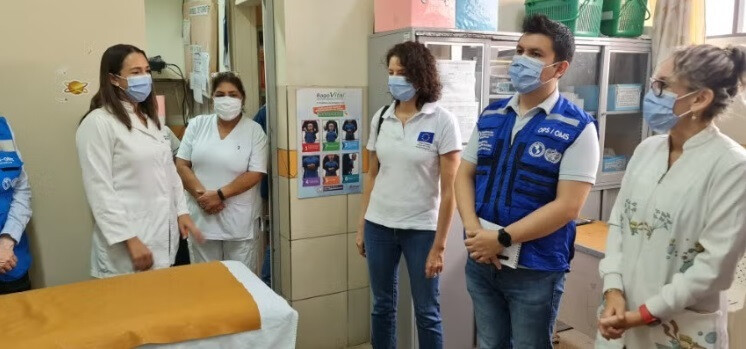
Santa Cruz de la Sierra, Bolivia – In the wake of a historically significant dengue epidemic across the Americas in 2024, Bolivia is proactively strengthening its ability to combat future outbreaks. With crucial financial support from the European Union's Directorate-General for European Civil Protection and Humanitarian Aid Operations (DG ECHO), the nation has implemented a series of strategic measures aimed at early detection, effective clinical management, and robust vector control.
These advancements were recently showcased to a European Union technical mission, highlighting the collaborative efforts of Bolivia's Ministry of Health and Sports, the National Arbovirus Program, Departmental Health Services (SEDES), the National Center for Tropical Diseases (CENETROP), and the Pan American Health Organization (PAHO). This coordinated response comes at a critical time, addressing the ongoing threat of dengue fever in the region.
Joelle Van Winghem, DG ECHO's regional health technical expert for the Americas, traveled to Bolivia to assess the impact of the EU-funded initiatives. Accompanied by PAHO experts in health emergencies and communicable diseases, the mission focused on evaluating progress in integrated dengue and arboviral disease management. Key areas of review included clinical protocols at all levels of healthcare, epidemiological and laboratory surveillance systems, public health communication strategies, community engagement efforts, and integrated vector control programs.
A significant component of Bolivia's strengthened response is the establishment of a network of 292 clinical leaders spanning 84 municipalities identified as endemic for dengue. This network plays a vital role in standardizing treatment protocols and optimizing healthcare service delivery. Dr. Eliana Vega, an internist and regional expert at Hospital Francés, emphasized the network's crucial impact on reducing dengue-related mortality by ensuring consistent and effective clinical management. The network also actively contributes to the continuous review and adaptation of Bolivia's National Clinical Management Guide for Arboviruses.
The European Union's support, channeled through PAHO, has also significantly bolstered CENETROP, Bolivia's national reference laboratory for tropical diseases. The provision of essential supplies and equipment has enhanced the laboratory's diagnostic capabilities. Furthermore, a strategic plan is underway to decentralize dengue diagnostics by establishing serology laboratories in key health centers, promising more rapid case detection at the local level.
Efforts to control the Aedes aegypti mosquito, the primary vector for dengue transmission, have also been intensified. The introduction of ovitrap surveillance systems in prioritized municipalities allows for proactive monitoring of mosquito populations. The technical mission observed the implementation of this system in District 4 of Santa Cruz de la Sierra. Additionally, training in the use of motorized backpack sprayers and the evaluation of fogging machine efficacy are underway to optimize vector control interventions. A newly developed National Entomological Surveillance Guide for Aedes aegypti will further standardize these efforts.
The collaborative approach has fostered strong inter-institutional coordination, culminating in a high-level meeting of 19 municipalities. Mayors and health officials at this meeting reaffirmed their commitment to the Integrated Dengue Management Strategy (EGI), underscoring a unified front in the fight against the disease.
The tangible outcomes of these strengthened strategies include improved preparedness of health services through enhanced diagnostic capabilities, standardized clinical management, reorganized emergency care pathways, and readily available supplies. First-level health facilities are now better equipped to triage patients, manage lower-risk cases effectively, and reserve referral hospitals for severe cases, thereby alleviating pressure on higher-level facilities.
The recent mission concluded with a constructive exchange on achievements, ongoing challenges, and future opportunities. A key takeaway was the critical importance of sustained investment in both dengue prevention and emergency response, particularly in the context of climate-sensitive communicable diseases, which are expected to become increasingly prevalent. Bolivia's proactive measures, supported by the European Union, represent a significant step forward in protecting its population from the growing threat of dengue fever.
[Copyright (c) Global Economic Times. All Rights Reserved.]




























